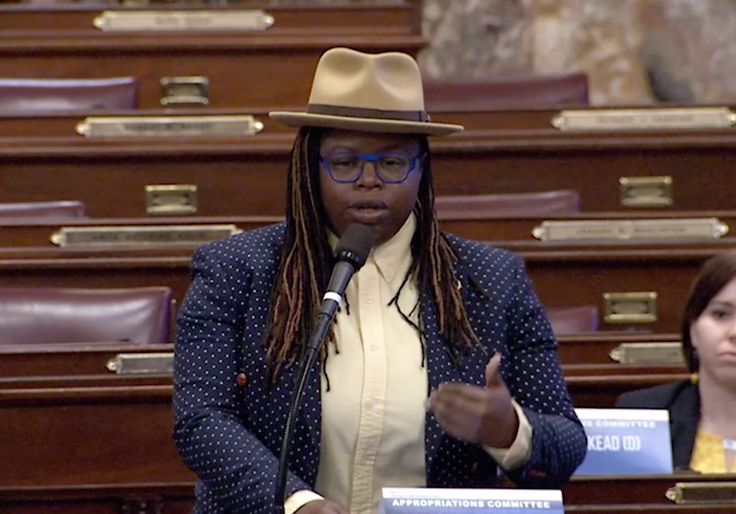A Pennsylvania lawmaker on Tuesday issued what free speech advocates are calling a veiled threat to withhold funding from the University of Pittsburgh over the school's decision to allow several conservative speakers on campus.
During an appropriations hearing on university funding, Pennsylvania state representative La'Tasha Mayes (D.) demanded that Pitt disinvite Cabot Phillips, Riley Gaines, and Michael Knowles from upcoming campus events. All three speakers have a history of "targeting transgender students," Mayes claimed—especially Knowles, whom she accused of saying that "transgender people should be eradicated."
Mayes called on university chancellor Patrick Gallagher, who was at the hearing to request additional funding from the state, to "cancel the speakers who are coming to campus"—implying that she might vote against his request if he did not. Mayes did not respond to a request for comment.
The exchange alarmed Speech First, a legal nonprofit focused on First Amendment issues, which called Mayes's remarks an "abuse of power."
"The state is saying that if the university doesn't violate its students' First Amendment rights, then their funding could be at risk," Cherise Trump, Speech First's executive director, said in a statement on Wednesday. "Lawmakers shouldn't be using veiled threats to hold funding over universities simply because they don't like a person who was invited to speak."
The shakedown highlights the growing willingness of progressive lawmakers to target offensive speech, in part by putting pressure on universities that permit it. In January 2022, for example, Democrats in both the Philadelphia City Council and the Pennsylvania State Senate urged the University of Pennsylvania to fire Amy Wax, the tenured law professor who has drawn fire for her views on race and immigration. Other Democrats, including Secretary of State Antony Blinken and Maryland senator Ben Cardin, have falsely claimed that "hate speech" is not protected by the First Amendment.
These attitudes have now found a foothold in the Pennsylvania House of Representatives, where Mayes is one of several lawmakers targeting Pitt. Led by Democrats Jessica Benham and Malcolm Kenyatta, the House's LGBTQ+ Equality Caucus issued a statement last week condemning the university for hosting "transphobic speakers," claiming it would endanger the lives of LGBT students.
"This is not a free speech issue," Benham said in the statement. "Hate speech is not protected speech. This is about the safety of transgender students and recognizing that transgender people exist."
Gallagher told Mayes that Pitt has no plans to cancel the upcoming events, citing the university's commitment to free speech. Pitt's College Republicans chapter has invited Knowles, a podcaster with the Daily Wire, to debate Deirdre McCloskey, a well-known transgender economist, on April 18. Phillips and Gaines will be discussing transgender sports this weekend at the invitation of Turning Point USA.
The speakers have sparked fierce blowback on campus. One petition, started by a Pitt student and signed by nearly 11,000 people, demanded that the school cancel all three events, calling them an attack on "trans bodies and humanity."
The speaker's views have been misrepresented by lawmakers such as Mayes, who said Knowles called for transgender people to be "eradicated." His actual remarks, delivered to the Conservative Political Action Conference this month, called for the eradication of "transgenderism," which he defined as the view that "men really can become women."
The pressure campaign comes amid an uptick in disruptive protests on university campuses, where shout-downs of controversial speakers are an increasingly common occurrence. In just the past two weeks, Stanford Law School and the University of California, Davis, have both seen high-profile disruptions—the first of Fifth Circuit appellate judge Kyle Duncan, the second of conservative commentator Charlie Kirk—that had the backing of university administrators.
Similar meltdowns have occurred across the country: Since 2017, talks have been canceled or disrupted at Yale Law School, the University of California, Berkeley, the University of California, Hastings, Law School, and the City University of New York School of Law. At most of those institutions, including Yale, the disruptors were not punished.
Though Pitt has not bowed to the protesters' demands, it has endorsed their underlying premise: The university said in a March 10 statement that "these events are toxic and hurtful for many people in our university community" and pledged to support anyone "negatively affected" by them.
"The presence of these speakers on our campus," Pitt said, "does not change the university's unwavering commitment to diversity, equity, inclusion, and belonging."
